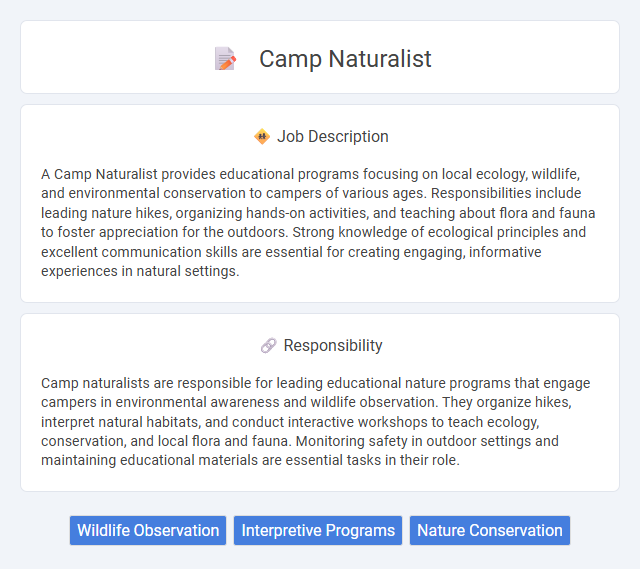
A Camp Naturalist provides educational programs focusing on local ecology, wildlife, and environmental conservation to campers of various ages. Responsibilities include leading nature hikes, organizing hands-on activities, and teaching about flora and fauna to foster appreciation for the outdoors. Strong knowledge of ecological principles and excellent communication skills are essential for creating engaging, informative experiences in natural settings.
Individuals who enjoy spending time outdoors and have a passion for nature and environmental education are likely to find a camp naturalist job suitable. Those with strong communication skills and patience may be well-suited for guiding and teaching campers about wildlife and ecosystems. People prone to long periods of physical activity and adaptable to changing weather conditions could naturally excel in this role.
Qualification
A Camp Naturalist typically requires a strong background in environmental science, biology, or ecology, often demonstrated through a bachelor's degree or relevant field experience. Essential qualifications include expertise in flora and fauna identification, outdoor education skills, and the ability to design and lead nature-based programs for diverse age groups. Certifications such as first aid, CPR, and wilderness safety further enhance a candidate's suitability for the role.
Responsibility
Camp naturalists are responsible for leading educational nature programs that engage campers in environmental awareness and wildlife observation. They organize hikes, interpret natural habitats, and conduct interactive workshops to teach ecology, conservation, and local flora and fauna. Monitoring safety in outdoor settings and maintaining educational materials are essential tasks in their role.
Benefit
A Camp Naturalist job likely offers the benefit of immersive outdoor experiences that enhance environmental knowledge and foster a deeper connection with nature. This role may provide opportunities to develop educational and leadership skills while engaging with diverse groups in a recreational setting. There is a probability of gaining professional growth through hands-on conservation work and community outreach initiatives.
Challenge
The role of a camp naturalist likely involves the challenge of balancing educational responsibilities with engaging diverse groups of campers in outdoor activities. Managing unpredictable weather conditions and ensuring the safety of participants while delivering informative nature-based programs can also pose difficulties. Adapting to varying skill levels and interests may require creative problem-solving and flexibility.
Career Advancement
A camp naturalist job offers valuable opportunities for career advancement in environmental education and wildlife conservation. Professionals gain hands-on experience leading educational programs, enhancing skills in ecology, public speaking, and environmental stewardship. Progression often leads to roles such as senior naturalist, environmental educator, or park ranger, fostering growth within the outdoor and conservation sectors.
Key Terms
Wildlife Observation
A Camp Naturalist specializing in wildlife observation conducts detailed monitoring and documentation of local fauna to educate campers about biodiversity and ecosystem health. Utilizing tools such as binoculars, field guides, and GPS devices, they identify species, track animal behaviors, and assess habitat conditions within camp environments. This hands-on engagement supports conservation efforts and fosters environmental stewardship among participants through immersive outdoor experiences.
Interpretive Programs
Camp naturalists design and lead interpretive programs that educate campers about local ecosystems, wildlife, and conservation efforts. These programs often include guided nature walks, interactive workshops, and hands-on activities that foster environmental awareness and stewardship. Effective camp naturalists use storytelling and scientific knowledge to create engaging and memorable learning experiences.
Nature Conservation
Camp naturalists specialize in nature conservation by educating campers about local ecosystems, wildlife habitats, and environmental stewardship practices. They design and lead interactive programs that promote sustainable outdoor activities and advocate for the protection of natural resources. Their role supports broader conservation efforts by fostering awareness and inspiring responsible behaviors in young participants.
 kuljobs.com
kuljobs.com